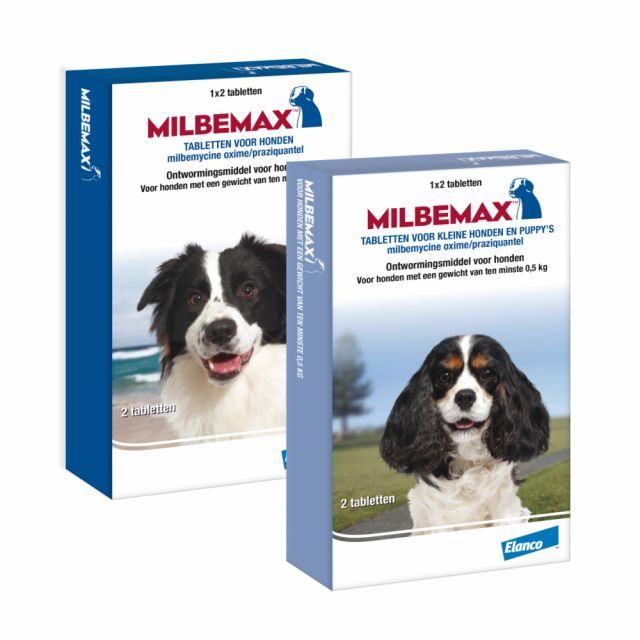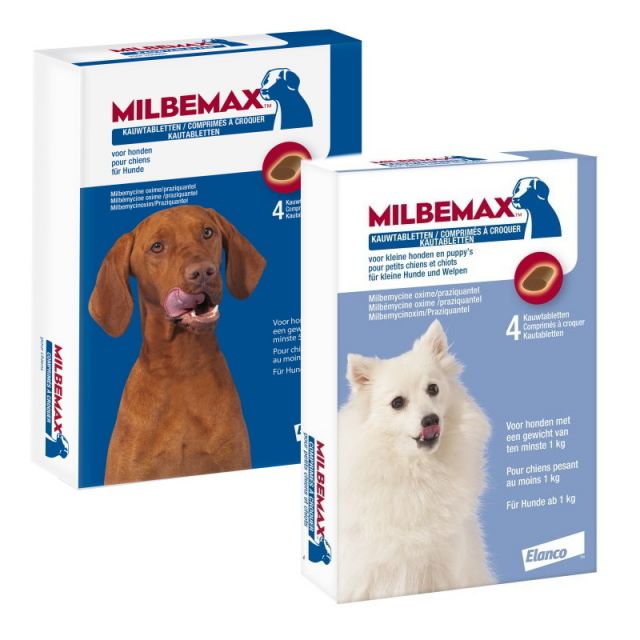Milbemax - Sheep - Dog - Horse
Milbemax is a broad-spectrum deworming product for dogs and cats. It is safe to use and effective against the most common worm infections. Additionally, Milbemax tablets and chewable tablets are palatable, making administration easy. The dewormer is available in various forms; the one you need depends on your pet's weight. For dogs, you can choose Milbemax tablets for dogs or Milbemax chewable tablets. Cat owners can choose Milbemax tablets for cats.
Active Ingredients in Milbemax
Milbemax contains the active ingredients Milbemycin oxime and Praziquantel. Milbemycin oxime targets roundworms (including lungworms), hookworms, and whipworms, and also helps prevent heartworm. Praziquantel is effective against tapeworms, including the fox tapeworm (Echinococcus).
Why is Deworming Your Pet Important?
Regular deworming of your dog or cat is essential. Worm infections can cause various health issues such as diarrhea, vomiting, coughing (in the case of heart or lungworm), weight loss, growth delays in young animals, and general lethargy. Furthermore, some types of worms can infect humans. To minimize risks for both animals and humans, a consistent deworming routine and/or regular stool checks are crucial!
Administration and Dosage of Milbemax
The tasty Milbemax tablets are given orally, preferably with some food. The tablets for small dogs, cats, and kittens are divisible, allowing for easy dose adjustments. Note: the Milbemax chewable tablet for small dogs is NOT divisible and should only be administered to dogs weighing 1 kg or more.
Milbemax Dosage for Dogs
Dosage according to body weight:
| Weight | Milbemax for small dogs and puppies | Milbemax for dogs |
| 0.5 – 1 kg | 1/2 tablet | |
| 1 – 5 kg | 1 (chewable) tablet | |
| 5 – 10 kg | 2 (chewable) tablets | |
| 10 – 25 kg | 1 (chewable) tablet | |
| 25 – 50 kg | 2 (chewable) tablets | |
| 50 – 75 kg | 3 (chewable) tablets |
For more information, see the package leaflet for Milbemax tablets or Milbemax chewable tablets.
Milbemax Dosage for Cats
Dosage according to body weight:
| Weight | Milbemax for small cats and kittens | Milbemax for cats |
| 0.5 – 1 kg | 1/2 tablet | |
| 1 – 2 kg | 1 tablet | |
| 2 – 4 kg | 1/2 tablet | |
| 4 – 8 kg | 1 tablet | |
| 8 – 12 kg | 1 1/2 tablets |
For more information, see the package leaflet for Milbemax for cats.
How Often Should You Deworm a Dog or Cat?
The deworming schedule may vary depending on the animal. When in doubt, consult your veterinarian. General advice:
- Adult dogs and cats: deworm on average 4 times a year (or based on stool analysis), depending on living environment and exposure to worms. Animals that eat raw meat or hunt may require more frequent deworming. If you live in or travel to an area where heartworm is endemic, monthly deworming during mosquito season is advised.
- Puppies: deworm at 2, 4, 6, and 8 weeks of age, then monthly until they are 6 months old.
- Kittens: start deworming at 3 weeks old, then repeat every 2 weeks until 2 weeks after weaning. Continue monthly deworming until they are 6 months old.
Medications and Supplements Alongside Milbemax
In addition to internal parasites like worms, dogs and cats also face external parasites such as fleas, ticks, mites, and sandflies. Some tapeworms use fleas as intermediate hosts, making co-infection with fleas and worms common. An effective flea treatment like Adtab or Advantage protects your furry friend from these pests. We’re happy to advise you on protection against external parasites in dogs and external parasites in cats.
Worm infestations often show no symptoms. Sometimes they cause diarrhea or other digestive issues such as vomiting. Probiotics like Protexin Pro-Kolin Advanced, Purina Pro Plan FortiFlora Dog or Purina Pro Plan Cat support your pet’s gut health after deworming with Milbemax. Water-binding psyllium fiber such as found in Iso-Gel helps firm up the stool.
If you have any questions about Milbemax or deworming your dog or cat, please contact us.



